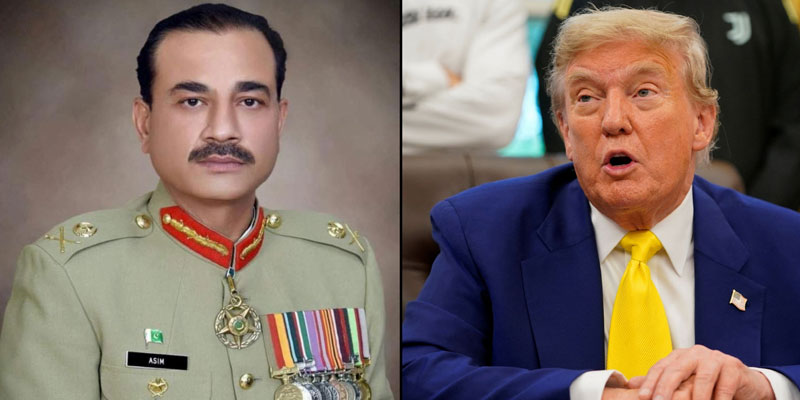Munir’s Washington Mission
Pakistani Army Chief, Field Marshal Asim Munir, embarked on a rare, high-profile visit to Washington, D.C., for a private luncheon with U.S. President Donald Trump on June 18, 2025 — the first time a Pakistani military leader was hosted solo by a U.S. president in decades.
As tensions simmer between Israel and Iran and fresh concern brews over nuclear escalation in South Asia, Munir’s visit is loaded with strategic significance. It underscores a potential reset in U.S.–Pakistan relations—hinged on military access, economic leverage, and diplomacy in a perilous geopolitical landscape.
Trump’s Pitch: Bases, Aircraft & Business
Military Footprint Exchange
At the working lunch, Trump reportedly proposed deepening U.S. access to Pakistani military bases and seaports. In return, he offered to fast-track fifth-generation fighter jets, advanced missiles, generous financial aid, and new security and trade pacts.
The trade-off was conditional: Pakistan would have to curtail its deepening ties with China and Russia, signaling Washington’s desire to realign Islamabad’s strategic posture away from Beijing.
Strategic Ambitions
Trump’s calculus extends beyond bilateral ties. With the Israel–Iran war escalating, the U.S. may aim to use Pakistani bases for logistics or support As a NATO-compatible ally, Pakistan's position in South Asia and the broader West Asia theatre could reshape operations and supply lines.
Contextual Dynamics: India, Ceasefire & Presidential Drama
Defusing India–Pakistan Brinkmanship
Trump credited himself with mediating the May ceasefire following intense cross-border exchanges between India and Pakistan—characterized by drone and missile attacks—while lauding both Munir and Indian PM Modi for stepping back from the brink
Munir echoed this view by nominating Trump for the Nobel Peace Prize
India, however, sharply contested U.S. mediation, maintaining the ceasefire was achieved through direct military dialogue
Symbolic First
The luncheon represented more than protocols. Defense Minister Khawaja Asif noted that Munir used the unprecedented invitation to press Trump on curbing U.S. military involvement in the Israel–Iran conflict. Trump acknowledged Pakistan's unique insight into Iran—"they know Iran better"—and said the two aligned on regional developments.
Economic Diplomacy & Cryptocurrency Talks
Beyond defense, Munir and Trump charted new commercial frontiers. The Pakistani military chief discussed prospects for crypto cooperation, trade expansion, and a U.S.-Pakistan economic partnership favoring long-term mutual growth
This dovetails with Islamabad’s efforts to attract U.S. investment in its mining and minerals sector and leverage reforms to win multilateral support, including a recent $1 billion ADB-backed facility from Gulf banks .
The Balancing Act: China, Russia & Pakistan’s Tightrope
Parallel Partnerships
While courting Washington, Pakistan continues deepening its ties with China, including discussions on acquiring Chinese J-35 stealth fighters and other military hardware
Potential U.S. Conditions
Accessing Pakistani bases may require Islamabad to make strategic compromises—namely, limiting its arms deals with Beijing and Moscow, a difficult task in the midst of economic and security dependencies.
Geopolitical Chessboard: Iran–Israel and Beyond
The meeting occurred against escalating violence across the Middle East, where Israel and Iran recently exchanged airstrikes and missiles.
Trump expressed concern over the Iran–Israel conflict and indicated Pakistan's potential role as a mediator or logistical partner, given its proximity and familiarity with Tehran.
Pakistan’s Diplomatic Tightrope
Islamabad, historically pro-Iran and cautious toward Israel, aims to de-escalate regional tensions while managing domestic expectations and geopolitical alliances.
A Strategic Gamble
Pakistan stands at a historic crossroads. Field Marshal Munir’s Washington visit unlocks unprecedented opportunity—political, military, and commercial—but only if Islamabad is willing to adopt a West-leaning posture at a time when its ties to China and Iran run deep.
For the U.S., the plan is bold: open military access, cut China and Russia ties, deepen defense-industrial partnership, and anchor Pakistan firmly in a U.S.-led regional coalition.
However, this hinges on mutual trust, strategic clarity, and Pakistan’s ability to balance its tripartite alliances without alienating any. Should Islamabad pivot successfully, this reset could restore U.S.–Pakistan alignment and offer capacity for regional stabilization. But if Islamabad resists, Washington’s gambit could fall flat—or worse, fracture existing shields and inflame domestic backlash.
This gambit is a high-stakes foreign policy play by Trump. Pakistan risks overplaying its hand—should it lean too much west, it may destabilize its ties with China and Iran; should it stay restrained, it risks losing Washington’s promise. The coming months will reveal whether Pakistan can execute a strategic pivot—or whether Trump’s reset effort remains a diplomatic mirage.
(With agency inputs)






















